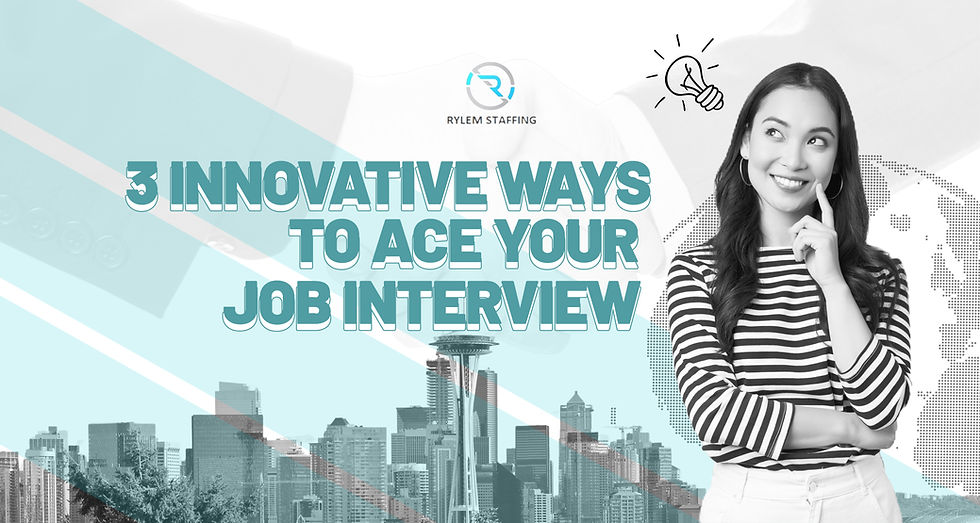CAN YOU EXPLAIN THIS GAP IN YOUR RESUME?
- Jon Bobillo
- Mar 16, 2022
- 4 min read
Updated: Mar 31, 2022
Do you still have the right set of skills? Here are 3 Innovative ways how to nail it.

This question is a nerve-racking part of the interview process. Suddenly, you look back and evaluate what you have done for that gap between your past employment and your current job search.
I'll be honest; this is a major red flag from the Q card. And understanding the question well helps you structure the correct thought pattern so that you can answer this question, then move on to the final step! Let us help you.
1. Honing Your Newly Acquired Skillset
This is a great way to flaunt the talents you have learned during your interval. Especially if it's related to the role, you are applying for. From the interviewer's point of view, we see it as someone who poses a character willing to learn new skills that may benefit the company. It also shows that you are always open to windows of opportunity.
You see, every business is unique. And we all know that in modern society, each company has its way of adapting to the fast-paced digital realm. In this sense, they need someone flexible enough to be adaptive to changes so that everyone will be in-line with the company's goals and vision.
If you are applying for a finance and accounting career, here is an example structure on how to respond when being asked by a question:
"During the X years of no work, I have decided to pursue my master's in accounting at X University. I have learned so much in forensic accounting, auditing, and more during the gap years! And I am willing to share great insights in the table once I become a part of your team."
The first point is one of the most constructive answers that usually nails the question. It comprises the entire plethora of your work ethic, character, experience, skills, and how strategic you can be once you join the team. If you are ready to spearhead your career journey with Rylem Staffing, you can request a recruiter to set up a meeting with you.
2. Project Experience
Like everything else on your resume, projects can help highlight experience that qualifies you for your next job. Adding successful projects is a great way to tie those skills directly to results, which employers want to see on your resume.
If you are wondering how to structure projects comprehensively, here are elevated tips on how to organize them in your resume:
Include Important details - add enough information about each project to understand it by anyone who quickly reads your resume. This includes:
Project title
Project description
Project dates
What your role was
Results or impact
Focus on your achievements
We've got a lot of Information Technology roles that best suit this vital section in the resume, and here is a thought example on how to adequately address this part:
"During my interval, I worked as a web developer and a programmer for three months. My overall course of action includes x, y, z starting from May to July 2021. During this period, I helped the teamwork on x, y, z, which resulted in massive lead/ sales on the website."
Tailor your project description well - you should only include projects relevant to the specific job you’re applying for. Even more than that, you should make sure your report or a project highlights its pieces.
3. Past Experience and Big Wins
Describing your experience and achievements help your employer to picture what it takes to come into the role and make an immediate impact. Here are four steps on how to properly construct your speech thought:
Ensure that your experience matches the job description.
If the interviewer is aware that you have studied the job description, it tells them you are serious about the role, and have taken steps to prepare for it.
Tell them your experience has made you “Commercially-Aware.” Being commercially aware means that you understand how a company does the business operation.
Describe your experience that includes the following four areas:
During an interview, the applicants' character-soft skills are part of the Q card that's factored in. Understanding the applicants' work ethic will play a massive role in teamwork. These are vital points you can use during the course process.
a. Effective communication
b. Teamwork
c. Problem-solving
d. Grace under pressure
Your experience means they won’t have to spend time supervising you.
Well, this comes on different levels. However, having a "proactive" attitude boosts your chance of passing the interview because you are doing the right thing at work even if no one is watching. This poses integrity and trust.
With our 14 years of practice in providing stellar business support and staffing solutions to businesses of all shapes and sizes, we have gained the right tools and skillset to guide our clients and candidates from the start until the end of their search. We make it our mission to help businesses hire the right professionals into their team and make it easier for candidates to find the right job that suits their skill set best.


Weddings in Marrakech Morocco offer a perfect blend of luxury, tradition, and breathtaking scenery. With its stunning riads, lavish resorts, and picturesque desert landscapes, Marrakech provides an idyllic setting for couples looking to celebrate their love in an unforgettable way. Whether it's a small intimate ceremony or a grand celebration, the city’s charm and elegance make it an ideal wedding destination.
Marrakech propose une large sélection de piscines adaptées à toutes les envies, du cadre intime d’un riad aux vastes bassins d’hôtels prestigieux. Certaines piscines offrent des vues imprenables sur les montagnes de l’Atlas, tandis que d’autres se nichent au cœur de jardins luxuriants, créant une atmosphère idyllique pour se relaxer.